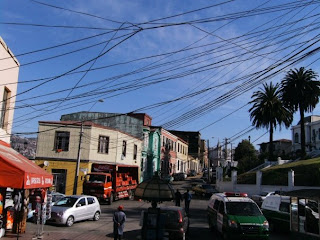
Val Paraiso was unlike any other city I had ever visited. The people were inherently the same - for at the core of it, we are all very, very similar - but the appearance of the city was staggering.
Because of its location, I like to call Val Paraiso the San Francisco of South America. It had a habit of quickly becoming lost in a wall of fog for minutes, sometimes hours, at a time. Then the fog would disappear in seconds, and clear blue skies and warm salt air would rush in and fill my chilled lungs. Tightly-packed houses of pastel and fluorescent hues stretched from the beach to the tops of the rolling hills, separated by bumpy cobblestone streets.

And yet the wires overhead made it so completely unlike the cleaner, almost pristine city streets near the Golden Gate - those frayed nets of electric wires that sprawled like thick cobwebs from house to house, strung vicariously as the need arose. They hovered buzzing overhead, so low in points that I saw the tallest men needing to duck beneath them as they walked up and down the sloping sidewalk.

Our bus edged laboriously up hills and around sharp corners, and my head began to pound as the sensation of being trapped in a labyrinth became even more pronounced. Still, careening around corners in an old grey minibus was far safer than trudging on foot - I recalled a story Denis had told over dinner the night before. He was mugged once in Val Paraiso because his camera had caught the eye of a passing thief. The quaint and colorful storefronts masked a city far more desperate and impoverished than the working-class neighborhoods of Santiago.
The bed and breakfast Elizabeth booked was in the heart of that dressed-up tourist section. It  was bright yellow, Victorian-style house with white shutters. The sunlight blazed overhead and reflected off the clean paint. I looked out across the patio, to the sea, and felt the fresh, warm breeze blow across my face. For nearly a week, my world had been covered by a cloud of smog.
was bright yellow, Victorian-style house with white shutters. The sunlight blazed overhead and reflected off the clean paint. I looked out across the patio, to the sea, and felt the fresh, warm breeze blow across my face. For nearly a week, my world had been covered by a cloud of smog.
 was bright yellow, Victorian-style house with white shutters. The sunlight blazed overhead and reflected off the clean paint. I looked out across the patio, to the sea, and felt the fresh, warm breeze blow across my face. For nearly a week, my world had been covered by a cloud of smog.
was bright yellow, Victorian-style house with white shutters. The sunlight blazed overhead and reflected off the clean paint. I looked out across the patio, to the sea, and felt the fresh, warm breeze blow across my face. For nearly a week, my world had been covered by a cloud of smog.We spent some time exploring the house before venturing out to the streets. After a bit of  wandering, we made our way to a restaurant downtown. Marco led us into a building that looked like an old warehouse. Most of the windows in the cement walls were shattered, but when we walked inside the effect wasn't creepy or frightening. Sunlight drifted through the windows onto the dusty floor, and the shadowed spaces held cool breezes that smelled of the ocean. The restaurant was upstairs.
wandering, we made our way to a restaurant downtown. Marco led us into a building that looked like an old warehouse. Most of the windows in the cement walls were shattered, but when we walked inside the effect wasn't creepy or frightening. Sunlight drifted through the windows onto the dusty floor, and the shadowed spaces held cool breezes that smelled of the ocean. The restaurant was upstairs.
 wandering, we made our way to a restaurant downtown. Marco led us into a building that looked like an old warehouse. Most of the windows in the cement walls were shattered, but when we walked inside the effect wasn't creepy or frightening. Sunlight drifted through the windows onto the dusty floor, and the shadowed spaces held cool breezes that smelled of the ocean. The restaurant was upstairs.
wandering, we made our way to a restaurant downtown. Marco led us into a building that looked like an old warehouse. Most of the windows in the cement walls were shattered, but when we walked inside the effect wasn't creepy or frightening. Sunlight drifted through the windows onto the dusty floor, and the shadowed spaces held cool breezes that smelled of the ocean. The restaurant was upstairs. Lunch was cheese empanadas and a water-based seafood soup. I wasn't feeling adventurous that day; I nibbled at an empanada while I watched Mike and Marco devour the tiny sea creatures whole, complete with slurping sound effects. Crystal constructed bits of crustacean into a being she called "No-face," and tried to make it talk.

I think it was their blank, staring eyes. It had to be. Because shortly afterward I got sick enough to never want to eat meat again.... again.



